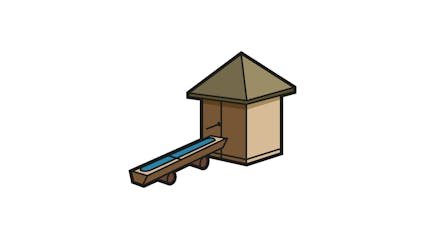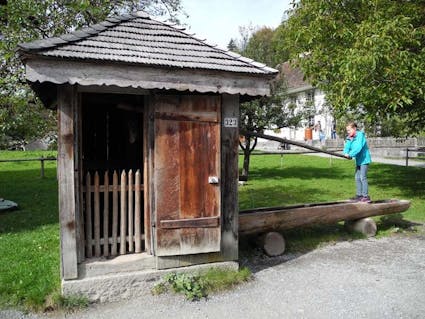323 – Groundwater wellhouse from Wimmis Berne, 19th Century
Nearby springs and brooks do not always supply the water needed for life. This example from Wimmis presents the way groundwater.

Scarce water
Nearby springs and brooks do not always supply the water needed for life. In the Jura mountains this problem was solved by collecting roof drainage and storing it in an underground reservoir such as the cistern (112). In the Valais, water from glacial brooks was led via kilometre-long canals (Suonen, bisses) to villages and pastures, sometimes over precarious structures on the walls of cliffs. The Midlands faced similar problems but found other solutions.
Wells as a solution
Each region solved its problems within the bounds of nature. This example from Wimmis presents a further way – groundwater! In this case in the 19th century a well shaft was sunk. A round hole was dug and walled with stone. Today the water level is at a depth of five meters, but ground water wells were often ten or more meters deep.
Simple but effective
This wellhouse is a constructively simple building: a timber frame stands on dressed stone. Boards are nailed on and a shingled roof protects the well from wind, weather and contamination. Instead of having to pull up a heavy water bucket, a wooden pump lightens the work.
Original location
The wellhouse stood to the east of Wimmis on the Pintelmatte meadow and supplied water for the livestock in the neighbouring stall. The Pintel is a hill with a limestone underbase and therefore has limited reserves of water. Nevertheless, water was able to rise from the depths toward the surface. The water level in the wellshaft was originally seven metres down. The wellhouse was in service until 1980.

Ballenberg
Swiss Open-Air Museum
Museumsstrasse 100
CH-3858 Hofstetten bei Brienz
Opening hours Administration
3 November 2025 to 8 April 2026
From Monday to Friday
8.30 am to 11.30 am
1.30 pm to 4.30 pm
Opening hours
9 April to 1 November 2026
10 am to 5 pm daily